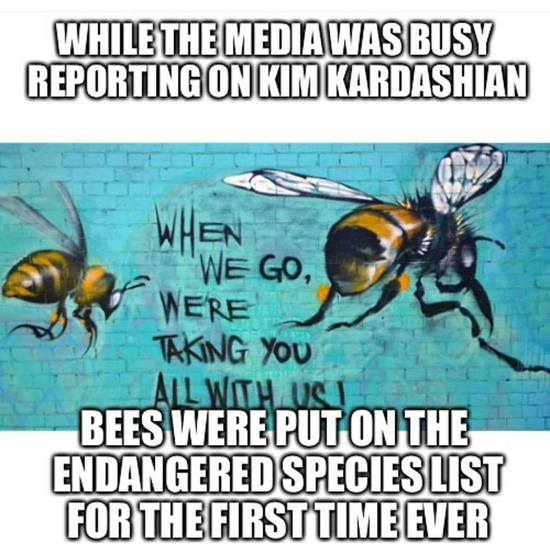Don't Believe the Buzz - Bees Aren't Going Extinct
By:
Concern over the mass death of bees and Colony Collapse Disorder (CCD) has been a media staple since reports of the epidemic first started surfacing in 2006. These stories are usually heavy on hyperbolic headlines like “Bees: If They Go, We Go”, “Bee population decreasing at an alarming rate” or "A World Without Bees," but low on good science. While initially, nobody knew why bee colonies were dying by the millions, nearly a decade of scientific research has narrowed down the causes of CCD, eliminating many of the fringe theories and misconceptions that dominated early reporting.
Even so, once an idea like "bees are going extinct" takes root, it's hard to reverse. So when news broke that bees had been “added to the Endangered Species List", it was seen by many as another ominous portent that our black and yellow friends were soon going to be gone forever.
To be sure, there was definitely a science-based reason for all of the concern. Starting in 2006, as many as one-third of the honeybee colonies in the world died, with their populations simply vanishing. As Slate put it in a July 2016 article about the collapse,
“The number of honeybee colonies peaked in 1989, at 3.5 million colonies; in 2008, two years after CCD was first characterized, that number dipped to 2.4 million, the worst year for honeybee populations in recorded history.”
If the collapse had continued at that rate, the world would have been devoid of bees within years – imperiling our entire food production system.
Thankfully, that didn't happen.
In fact, the population trend actually began reversing itself and the need to worry about the extinction of bees appears to be passing.
The same Slate article outlining the decline of bee populations pointed out this increase, saying:
"Since their lowest point, honeybee populations in the U.S. have climbed at a modest pace and now stand at 2.7 million colonies."
Since most colonies have an average of 50,000 bees, 300,000 new colonies means a growth of 15 billion new bees since their lowest ebb.
While honeybees have died by the millions, queen bees lay thousands of eggs per day, and a certain percentage of bees die off every year no matter what. The total number of honeybee colonies in the world was never down to a critical level. And now, it's growing, thanks to more queens being bred and more colonies being created.
Furthermore, concerns about "bees" being added to the Endangered Species list also ignored basic facts. It wasn't "all bees" in general nor was it the common honey bee in particular that were being categorized as endangered. Only variants of a specific Hawaiian bee, called the yellow faced bee, were actually put on the list.
We also know that CCD is the result of a complex set of factors that are both natural and human-caused. The US Department of Agriculture published a “Honey Bee Health Action Plan” in 2015 that gave seven interlinked causes for CCD, including mites and pests, pathogens, pesticide exposure, nutritional deficiencies, a decline in pasture land, and inherent genetic factors. How these all these factors work together is still not understood – but when the EU banned three popular neonic pesticides, it had no real effect on bee populations.
So if CCD is declining and bee populations are increasing, why is there still so much public outcry about bees dying off?
Perhaps it's because the nuances of actual scientific evidence don't always make for a eye-catching meme.
Thus, Facebook is still full of concern trolling about being distracted by frivolities while bees disappear - even though they're not.
 Anonymous - dailykos.com
Anonymous - dailykos.com
And a fake Banksy Twitter account posted a video of Eli Manning making a sad face and declaring “when ur brother wins the super bowl but then u remember that bees are dying globally at an alarming rate” that was re-tweeted tens of thousands of times.
It also spawned a slew of copycat memes that borrowed the phrasing “bees dying globally at an alarming rate.”
But which bees? Who was alarmed? And what exactly was the rate at which they were dying? Unsurprisingly, there wasn’t a viral meme answering any of these questions.
The bottom line is that while honeybee health is still fragile, it’s better than it’s been in years.
